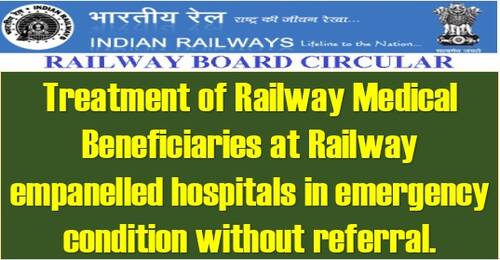Health Delivery System & Emergency Treatment in Railway Empanelled Private Hospitals – Revised Instructions in supersession on Order dtd 28.12.2020 and 15.06.2021
GOVERNMENT OF INDIA
MINISTRY OF RAILWAYS
RAILWAY BOARD
No. 2018/TransCell/Health/CGHS (eOff.No.3270783)
Dated: 16.06.2021
The General Manager, All Indian Railways/PUs, NF( Con), CORE
The DG/RDSO/Lucknow , DG/NAIRNadodara
CAOs, DMW/Patiala, WPO/Patna, COFMOW/NDLS, RWP/Bela, CAO/IROAF
Sub: Implementation of Health Delivery System & Emergency Treatment in Railway Empanelled Private Hospitals Revised Instructions.
Ref: Board’s letters no: 2018/TransCell/Health/CGHS dated 28.12.2020 and 15.06.2021
In order to improve the health delivery system and emergency treatment in railway empanelled private hospitals, Board had approved a policy vide letter dated 28.12.2020 at Reference, above. Thereafter , a number of suggestions have been received. Based on these suggestions, Board (Member Finance and Chairman & CEO) have approved a policy, as detailed in subsequent paras.
(This is in supersession of instruction s contained in Board’s letter No. 2018/TransCell/Health/CGHS (eOff.No.3270783) dated 28.12.2020 & 15.06.2021, as referred above.)
- Railway medical beneficiaries (serving/retired) under emergency condition can get admission in any railway empanelled hospital without any prior referral. The empanelled hospital should not insist on referral from railway hospitals or demand advance in emergency conditions and the hospital will provide cashless/Credit medical facilities to patients.
- The emergency conditions are defined in Memorandum of Understanding between CGHS empanelled hospitals and Government of India (CGHS Authorities) (Annexure-I) or as amended by CGHS from time to time and same will be applicable in Indian Railways.
- The valid UMID Card/CTSE Card issued will be treated as identification as Railway Medical Beneficiary. Railways have to make sure that these cards are accepted in the empanelled hospital under the jurisdiction/empanelment.
- Situation may arise where Railway hospital, after scrutinizing admission report submitted by empanelled hospital, finds that the patient is not suffering from an emergency. In such cases, the hospital bills upto the stage of such determination, shall be paid by Railway directly to Hospital. However, the patient can continue to avail treatment at the empanelled hospital, if so desired, by paying CGHS rates or hospital rates, whichever is less on the patient’s cost, thereafter.
- The nature and appropriateness of the emergency is subject to verification, which may be verified, inspected or medically audited by the nominated authority on random basis at its own discretion.
- The Hospital will intimate all instances of patients admitted as emergencies (without prior permission) to the Railway authorities, at the earliest and within 24 hours and Railway will revert within next 24 hours, otherwise it will be treated as deemed approval. The empanelled hospital will clearly mention/certify the emergency condition as per MoU.
- Railway Hospital as well as empanelled hospital will share the contact number and email address for communication for this purpose and will ensure to put on the website of Railways as well as of the hospital. The documents and approvals will be shared on the email to save the time and difficulties faced by the patients. The empanelled Hospital will not insist to patients to get the approval of referral/extension from the Railway Hospital. Same will be coordinated and approved on the contact number and email by the empanelled Hospital and Railway Hospital.
- Railway hospitals shall refer to the empanelled hospital for appropriate duration as per the package. In case of additional stay for treatment , same procedure will be followed as per para 6 & 7 above.
- Also, the empanelled hospitals will provide the necessary treatment in OPD or otherwise to valid Railway Medical Beneficiary at the CGHS approved rates or hospital rates, whichever is less for the treatment in non-referral and non-emergency case at Railway Medical Beneficiary’s cost.
- Zonal Railways shall include provisions for conditions given from Para 1 to 9 above, in their MoU with the referral hospitals and also include that refusal to provide treatment to bonafide railway medical beneficiaries in emergency cases without valid ground would attract disqualification for continuation of empanelment. Also, MoU to be updated including removal of ambiguities accordingly.
- The Zonal Railways shall keep above provisions in view, while projecting budget requirement under relevant head. Since expenditure is to be borne by Railways, the bills shall be paid by the Railway Unit which had empanelled the hospital, without making any reference or debit etc. to the Railway Unit to which beneficiary may belong.
- Proper accountal & record of such payments may be maintained by Health Department to facilitate audit of such expenditure.
This issues with the concurrence of Associate Finance of Transformation Cell of Railway Board.
Kindly acknowledge the receipt and ensure compliance.
(Umesh Balonda)
Executive Director/S&T Transformation Cell
Annexure-I
The following ailments may be treated as emergency which is illustrative only and not exhaustive, depending on the condition of the patient:
- Acute Coronary Syndromes (Coronary Artery Bye-pass Graft/ Percutaneous, Transluminal Coronary Angioplasty) including Myocardial Infarction, Unstable Angina, Ventricular Arrhythmias, Paroxysmal Supra Ventricu lar Tachycardia, Cardiac Temponade, Acute Left Ventricular Failure/ Severe Congestive Cardiac Failure, Accelerated Hypertension, Complete Heart Block and Stoke Adam attack, Acute Aortic Dissection.
- Acute Limb Ischemia, Rupture of Aneurysm, Medical and Surgical shock and peripheral circulatory failure.
- Cerebra-Vascular attack-Stokes, Sudden unconsciousness, Head injury, Respiratory failure, decompensated lung disease, Cerebra-Meningeal Infections, Convu lsions, Acute Paralysis, Acute Visual loss.
- Acute Abdomen pain.
- Road Traffic Accidents I with injuries including fall.
- Severe Hemorrhage due to any cause.
- Acute poisoning.
- Acute Renal Failure.
- Acute abdomen pain in female includ ing acute Obstetrical and Gynecological emergencies.
- Electric shock.
- Any other life threatening condition.

COMMENTS